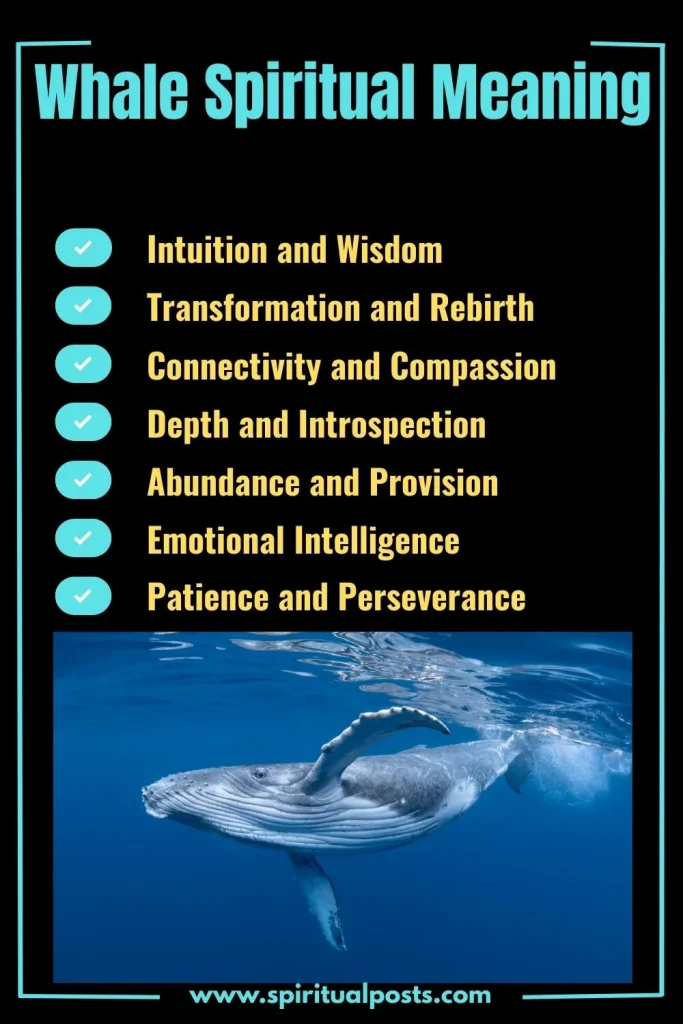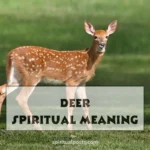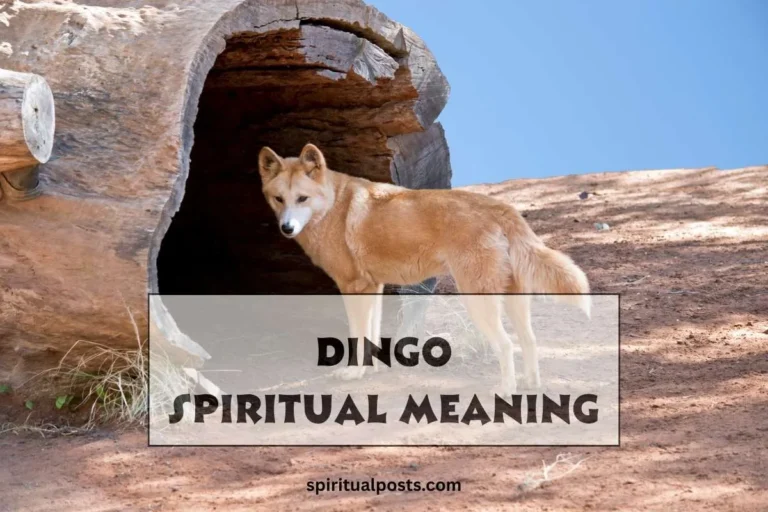Whale Spiritual Meanings and Symbolism

Whales have deep spiritual meaning in many cultures around the world. These majestic creatures are often seen as symbols of wisdom, strength, and the connection between all living things. Their enormous size and mysterious nature make them powerful symbols of the unknown.
In some traditions, whales are considered guardians of the ocean, holding ancient knowledge of the natural world. Their presence reminds us of the delicate balance of life and the importance of respecting nature. Many people feel a sense of awe when encountering whales, as if they carry a message from the depths of the subconscious.

Key Takeaways
- Whales symbolize intuition, wisdom, and the vastness of the subconscious mind, encouraging exploration of the spiritual dimensions of existence.
- Whales represent the cycle of life, death, and renewal, inspiring personal growth, transformation, and the ability to flow with life’s ebbs and flows.
- Whales embody connectivity and compassion, reminding us of our deep interconnectedness with nature and the importance of cultivating a more caring and nurturing existence.
- Whales’ effortless navigation through the vast oceans mirrors our capacity for introspection, self-discovery, and the exploration of the hidden truths within the human psyche.
Introduction to Whales
Whales are some of the most fascinating creatures in the ocean, ranging from the enormous blue whale to the playful orca. Their movements—whether breaching the surface or gliding underwater—captivate anyone who sees them. They inspire wonder not just because of their size, but also because of their intelligence and social behavior.
Beyond their physical traits, whales hold deep cultural and spiritual importance. Many indigenous cultures view them as sacred beings, representing guidance, protection, and emotional depth. Their role in the ocean’s ecosystem also highlights their connection to life’s natural rhythms.
What Does It Mean When You See a Whale?
Spotting a whale, whether in real life or in dreams, can carry special meaning. These encounters often symbolize intuition, wisdom, and emotional awareness. Their ability to navigate deep waters mirrors our own journey into hidden thoughts and feelings.
Whales also remind us to trust our instincts and move with life’s natural flow. Their complex communication suggests the importance of honest expression and deep connections. Seeing a whale may be a sign to explore your inner self and embrace personal growth.
Whale Symbolism
Whales represent emotional depth and the mysteries of the mind. Their massive size reflects the vastness of human emotions, while their underwater world symbolizes the subconscious. They encourage us to explore our hidden fears and desires.
Their migration patterns align with natural cycles, teaching us to accept life’s ups and downs. By observing whales, we learn to trust our intuition and adapt to change. They serve as guides, helping us navigate both personal and spiritual journeys.
7 Spiritual Meanings of Whale
1. Intuition and Wisdom
Whales have long been seen as symbols of intuition and wisdom. Their presence in stories and beliefs shows how deeply they are connected to something bigger than everyday life. People often believe whales carry messages from the spiritual world, thanks to their quiet strength and calm nature.
These sea giants rely on their unique ability, echolocation, to find their way through the deep oceans. This special skill reflects a kind of inner knowing, one that helps them move confidently in places we can’t even see. It’s a reminder to trust your instincts, especially when you’re unsure of the path ahead.
Whales are closely tied to water, and water often represents our emotions and deeper thoughts. Because of this, whales encourage us to pay attention to how we feel and what’s going on inside us. They help us notice the quiet messages from our heart and mind.
When a whale shows up in your dreams or life in some way, it might be asking you to listen to your inner voice more closely. This could be a sign that you’re ready to discover something new about yourself, or to make choices that come from deep within.
2. Transformation and Rebirth
Whales often represent big changes and the chance to start fresh. In the spiritual world, they are linked with transformation and rebirth, showing us how we can grow and leave behind what no longer helps us.
Whales move through life by diving deep into the unknown and then rising back up. This journey reflects the cycles we go through as we let go of old habits and begin again. Their smooth, calm movements in the water remind us that growth doesn’t always need to be rushed—it can happen gently and naturally.
Sometimes, seeing a whale can mean it’s time to release old beliefs or pain. These might be things you’ve carried for a long time, and the whale’s message is that it’s okay to move forward. You don’t need to stay stuck in the past.
The way whales migrate—traveling across oceans to find new places—also shows the idea of personal discovery. It’s about going on your own journey, even if it takes time, and finding new parts of yourself along the way.
3. Connectivity and Compassion
Whales are also seen as symbols of connection and kindness. Their lives in the open ocean show how everything in nature is linked together, including us. Their deep calls and songs remind us how important it is to communicate with others.
Whales often live in groups and take care of one another. This behavior shows that being part of a community and helping each other matters. It teaches us that we’re not alone, and we all do better when we look out for others.
Their size and grace remind us that even the strongest beings can be gentle. Whales move with care and peace, teaching us to lead with empathy and understanding instead of force or anger.
Connecting with whale energy can help you become more caring in your relationships. It can also make you more aware of how your actions affect the world around you. That awareness is the first step toward living with a more open heart.
4. Depth and Introspection
Whales encourage us to take a deep look within ourselves. They swim through the vast, quiet oceans, much like we can explore our inner thoughts and feelings. These deep dives aren’t always easy, but they often lead to important discoveries.
Their ability to sink into the darkest parts of the sea shows us that we, too, can face what’s hidden. Sometimes, we avoid our deeper emotions because they’re uncomfortable. But the whale reminds us that there’s value in being honest with ourselves.
As you reflect on your own life, you might find answers that were hiding beneath the surface. You start to see patterns, strengths, or even things that need healing. This process, although slow, can lead to a better understanding of who you are.
Like the whale returning to the surface after a long dive, you can come back with clarity and purpose. This journey into your mind and heart is not about being perfect, but about being real and present with yourself.
5. Abundance and Provision
Whales are powerful symbols of abundance and nourishment. They survive in the open sea, feeding and storing energy in ways that show how rich and supportive nature can be. Spiritually, whales remind us that we have what we need—and more.
Because of their size and strength, whales show that there is no shortage of resources when we live in balance. They reflect the idea that when we trust life and move with confidence, things often fall into place. There’s a sense of flow in how they live.
Whales eat what they need and store enough for long journeys. This can teach us to receive what’s good for us—whether it’s love, support, or inspiration—and use it to keep going. There’s nothing wrong with asking for what you need.
Letting go of fear about not having enough opens the door to a mindset of abundance. With this kind of thinking, you’ll notice more opportunities, more kindness, and more growth than ever before.
6. Emotional Intelligence
The whale also teaches us how to handle emotions wisely. Known for their deep and complex sounds, they communicate in ways that show a high level of emotional awareness. They remind us to speak and listen with care.
Their ability to pick up on the feelings of others makes them a symbol of empathy. This helps you understand your own feelings better and respond to others with kindness. It’s not always easy, but it makes your relationships stronger.
Whales don’t rush. They take their time, moving smoothly through water, much like how we can learn to move through our feelings without getting overwhelmed. Their quiet strength teaches us how to stay calm even in tough emotional times.
By following this example, you learn how to better understand yourself and others. This kind of emotional growth leads to more meaningful connections and a deeper sense of inner peace.
7. Patience and Perseverance
Whales are known for their slow, steady movements. They don’t rush, yet they travel thousands of miles through the ocean. This shows how patience and perseverance are key parts of their journey—and can be part of yours too.
Whales often wait for the right moment to act, especially when hunting or navigating long distances. This teaches us that success doesn’t always come quickly. Sometimes, the most important things take time and effort.
Their long migrations are also powerful symbols of endurance. No matter how far they go, they keep moving forward. Even when challenges appear, they stay the course and finish their journey.
This calm but strong energy can guide you through tough times. It shows that if you stay focused and steady, even slow progress is progress. Over time, you’ll get where you need to go—one step, or one wave, at a time.
Whale Symbolism in Different Cultures and Contexts
Whales carry deep spiritual meaning across many cultures. Their size, mystery, and connection to the ocean have made them powerful symbols of wisdom, strength, and transformation. From Native American traditions to Eastern mythology, whales are often seen as guardians, guides, and messengers between worlds.
Native American Culture
In Native American traditions, the whale symbolizes strength, wisdom, and harmony with nature. Coastal tribes view whales as sacred, representing the ocean’s power and mystery. Many legends describe whales as protectors, guiding lost travelers or sharing ancient knowledge.
The whale’s ability to dive deep and resurface is seen as a metaphor for life’s cycles. Some tribes believe whales carry messages between humans and the spirit world. Art and ceremonies often feature whales to invoke protection, blessings, and a deeper bond with nature.
Celtic Culture
Celtic mythology portrays whales as wise guardians of the sea. They were believed to understand the ocean’s rhythms, linking them to the natural flow of life. Whales were also seen as guides to the Otherworld, helping souls transition after death.
Their nurturing nature connected them to Celtic goddesses, symbolizing motherhood and protection. In Celtic art, whales often appear alongside other mystical sea creatures, reinforcing their sacred status.
Nordic Culture
In Norse mythology, whales were powerful, ancient beings tied to the sea’s mysteries. They were linked to Njord, the god of the ocean, symbolizing wealth and abundance. Whales were also thought to guide souls to the afterlife.
Norse burial sites sometimes included whale bones, showing their spiritual importance. For seafaring Vikings, whales represented both respect for nature and the unknown depths of the world.
African Culture
In African traditions, whales symbolize strength, prosperity, and divine connection. The Yoruba people associate them with Olokun, a water deity ruling the ocean’s riches and dangers. Zulu culture sees whales as messengers from ancestors, offering wisdom and protection.
Whale bones and teeth are used in rituals, showing deep reverence. Across Africa, whales represent resilience and adaptability, honoring their ability to navigate vast, unpredictable waters.
Eastern Culture
In Chinese mythology, whales are guardians of the sea, balancing strength and calmness. Japanese folklore depicts them as wise protectors, guiding sailors safely. Their journeys symbolize spiritual growth and exploration.
Hindu tradition tells of Vishnu’s Matsya avatar, a giant fish or whale that saved the world from a great flood. This story highlights the whale’s role as a divine protector in Eastern spirituality.
Hindu Culture
The Matsya avatar is central to Hindu beliefs, where Vishnu takes the form of a whale to preserve life. This myth shows the whale’s link to creation, survival, and cosmic balance. Whale imagery appears in Hindu art, symbolizing divine power and mystery.
Arts and Literature
Whales inspire art, stories, and legends worldwide. Ancient cave paintings, modern novels, and religious texts feature them as symbols of power, wisdom, and nature’s mysteries.
In Inuit tales, whales guide souls to the afterlife. Hindu art depicts them as divine saviors. Across cultures, whales remain a timeless muse for creativity and spiritual reflection.
Mythology
Whales appear in myths as deities, protectors, and symbols of life’s cycles. Inuit legends describe them as weather-controlling spirits, while Norse myths feature the world-encircling Jörmungandr.
Many cultures see whales as bridges between worlds, guiding souls or representing rebirth. Their presence in global mythology reflects humanity’s awe for these majestic creatures.
Whale Biblical Meanings
In the Bible, whales represent God’s power and authority over creation. Genesis 1:21 mentions, “And God created great whales, and every living creature that moveth,” showing how these massive creatures reflect His greatness. Their size and strength remind us of nature’s awe-inspiring wonders.
One famous story is Jonah and the whale (Jonah 1:17), where a great fish swallows Jonah after he disobeys God. This teaches that no one can escape divine will, and even in darkness, redemption is possible. The whale becomes a symbol of second chances.
The whale’s role in Jonah’s story also mirrors life, death, and rebirth. Just as Jonah was released after three days, it hints at spiritual renewal. This idea connects to themes of transformation and faith in difficult times.
Spiritual Meaning of Dreaming About a Whale
Dreaming of a whale often signals deep spiritual growth or a major life change. Since whales live in the ocean’s depths, they can represent hidden emotions or unexplored parts of your mind. Their appearance may mean you’re starting to understand yourself better.
A whale in dreams can also reflect vulnerability or healing. Its gentle yet massive presence might show you’re processing strong feelings or past wounds. This dream could encourage you to face fears and embrace self-discovery.
Sometimes, a whale dream symbolizes a desire for peace and connection. If you feel drawn to its calm energy, it might mean you’re seeking balance or a stronger link to nature and spirituality.
Whale Spirit Animal, Totem, and Power Animal
If the whale is your spirit animal, it highlights intuition and emotional depth. Like the whale navigating the ocean, you’re guided to explore your inner world with patience and curiosity. This totem teaches trust in life’s natural rhythms.
As a power animal, the whale helps you communicate openly and express true feelings. Its strength reminds you to stay resilient, even in emotional tides. Many find comfort in its wisdom during tough transitions.
Those connected to the whale totem often feel a pull toward mystery and reflection. It encourages listening to your instincts and embracing life’s cycles—just as the whale moves between ocean depths and the surface.
Final Thoughts
Whales carry rich symbolism across faiths and cultures, from divine power to personal growth. Whether in scripture, dreams, or as spiritual guides, they remind us of strength, renewal, and deep connection.
By understanding their meanings, you can uncover new layers of wisdom in your own journey. The whale’s lessons—patience, intuition, and resilience—are timeless gifts for those willing to listen.
You Might Also Like
1) 12 Spiritual Meanings of Overflowing Water in Dreams
2) 10 Spiritual Meanings of Water and Symbolism
3) Arapaima Spiritual Meanings and Symbolism
4) Gila Monster Spiritual Meanings and Symbolism
5) Flounder Spiritual Meanings and Symbolism














